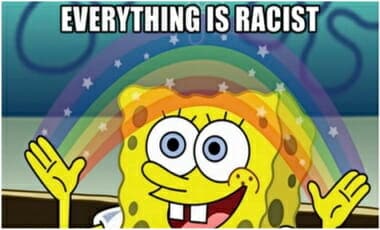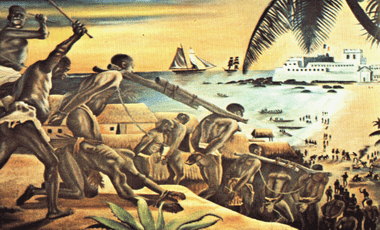This is with a hat-tip to:
GOP presidential candidate Vivek Ramaswamy traveled over to CNN This Morning on Wednesday to discuss his campaign. During the part of the interview about his recent speech at the NRA convention, host Don Lemon told Ramaswamy that it was “insulting” he would dare to say that black Americans enjoy equal rights.
(The longer video can be watched HERE)
NEWSBUSTERS has this:
….As Ramaswamy started to explain himself, Lemon repeated himself, “Okay, but that wasn’t fought for black people to have guns. I think—”
Again, Ramaswamy started to defend himself, “black people did not get to enjoy the other freedoms until their Second Amendment rights were secured and I think that that’s one of the lessons—”
Lemon was not happy with that explanation and started to shift the conversation away from guns to about race more generally, “But black people still aren’t allowed to enjoy the freedoms.”
After Ramaswamy told Lemon he disagreed and was “doing a disservice to our country” with those remarks, Lemon essentially told Ramaswamy to shut up, “when you are in black skin and you live in this country then you can disagree with me.”
Ramaswamy then called Lemon out for trying to use race to silence his critics and argued “Black Americans… absolutely have equal rights in this country.”
Lemon replied, “I think it’s insulting to black people, it’s insulting to me as an African-American. I don’t want to sit here and argue with you because it’s infuriating for you to put those things together. It’s not right, your telling of history is wrong.”
After Ramaswamy asked what he got wrong, Lemon returned to the straw man, “you’re making people think the Civil War was fought for black people—only for black people to get guns and for black people to have—”
[RPT BREAK]
This is a common thing I have found in Left’s and Atheist’s response to things they will say that the point you are making IS THE point of the of the discussion. So in this instance Don Lemon is saying Ramaswamy is saying that the Civil War was fought [only] to secure gun rights for black Americans. That that is it.
That is a straw man.
The Civil War was fought to secure Constitutional rights for black Americans.
SEE: What Was the Civil War Over?
I am gonna take another break within the break to give another example of how deterministic the Left thinks. This comes from my many years old post that grew beyond the debate I had with a professor of history at Michigan State U. We were told over-and-over-and-over again that THE REASON we entered Iraq was for WMDs. That is a rewriting of history.
[break-in-break]
Reasons for Entering Iraq
This next portion is taken from a series I do in responding to a local writer in a small journal. The original post is entitled, “Concepts: Are We Insane? Nope, Just You Van Huizum.“
U.N Resolutions
Yet another unfounded swipe at the Iraq War. John Van Huizum lives in a bubble where if he has come to a conclusion years ago… that’s it! History forever stays right where John wants it to stay. Here is an excerpt of John’s (click to enlarge it) article shows a complete lack of history. 
I doubt he think any differently about Vietnam based on his 1970’s conclusions. It wouldn’t matter that after 1990 — the fall of the Wall — 100,000 of thousands of Soviet era documents were now being translated and reviewed by military historians and good books based on MORE historical documents. Because these new documents support the traditional (and not the Left’s reasoning) for entering and fighting this proxy war of WWIII (the Cold War), this new information is rejected from the matrix of the left’s consciousness. But that is neither here-nor-there.
So, let’s deal with some of the contentions in John’s excerpted article. Firstly he notes that there were insufficient reasons for going to war.
May I remind him there were many U.N. Resolutions against Iraq that were almost all not met:
- UNSCR 678 – November 29, 1990
- UNSCR 686 – March 2, 1991
- UNSCR 687 – April 3, 1991
- UNSCR 688 – April 5, 1991
- UNSCR 707 – August 15, 1991
- UNSCR 715 – October 11, 1991
- UNSCR 949 – October 15, 1994
- UNSCR 1051 – March 27, 1996
- UNSCR 1060 – June 12, 1996
- UNSCR 1115 – June 21, 1997
- UNSCR 1134 – October 23, 1997
- UNSCR 1137 – November 12, 1997
- UNSCR 1154 – March 2, 1998
- UNSCR 1194 – September 9, 1998 (“Condemns the decision by Iraq of 5 August 1998 to suspend cooperation with” UN and IAEA inspectors, which constitutes “a totally unacceptable contravention” of its obligations under UNSCR 687, 707, 715, 1060, 1115, and 1154.)
- UNSCR 1205 – November 5, 1998
- UNSCR 1284 – December 17, 1999
….See Additional UN Security Council Statements…
Official U.N. resolutions aside, Bush went to Congress and made his case with these and many other points. One point being that Iraq was firing almost everyday on our fighter pilots in the no-fly zone. In the cease fire of the First Gulf War, this was enough — under international law — to RESUME aggression….
So you see, the reasons of going in were many. But the Left is so tunnel visioned that this is why they often lose in any conversation they stay in over 2-minutes.
[break-in-break over]
The War was for applying many principles of rights to and for blacks while trying to unite the country, namely freedom. And an important aspect of this is the 2nd Amendment.
The Reconstruction era was mutated under Democrats.
- The period immediately following the Civil War (1865 -1877) is known as Reconstruction. Its promising name belies what turned out to be the greatest missed opportunity in American history. Where did we go wrong? And who was responsible? Renowned American history professor Allen Guelzo has the surprising answers in this eye-opening video.
MORE EXAMPLES
Slavery
- Excerpts on Slavery (D’Souza, Williams, Johnson, and Sowell)
- Some Historical Perspective on Slavery (Medved, Roberts)
- Percentages Of Slaves Brought To America (Davis, Sowell)
- The Bible & Slavery (Me: PDF)
-
- Does the Bible Command Slavery? (Detective J. Warner Wallace)
- Obama Gets Slavery via the Bible Wrong (Dennis Prager)
- How Democrats Have Used the Bible Wrong (Alfonzo Rachel)
- Suing the Democrats Over Slavery, Lynching, and Jim Crow
- Democrats Responsible for Slavery, Republican Party for Abolition
- Fallacies of Slavery and Race
- American Slavery: Separating Fact From Myth
- Democrats Support White Supremacy
- Republicans Work to End Slavery
- US Constitution is Anti-Slavery
- Congress Celebrates the End of Slavery
- Neglected Voices of African Americans
- Reconstruction: The Good, the Bad and the Ugly
- Democrats and the KKK
The Third Force Act, also known as the KKK or the Civil Rights Act of 1871, empowered President Ulysses S. Grant to use the armed forces to combat those who conspired to deny equal protection of the laws and, if necessary, to suspend habeas corpus to enforce the act. Grant signed the legislation on this day in 1871. After the act’s passage, the president for the first time had the power to suppress state disorders on his own initiative and suspend the right of habeas corpus. Grant did not hesitate to use this authority. (POLITICO)
Terrorist Arm of the Democrats
- Blacks AND Whites [Because Republican] Lynched by Democrat KKK
- The Southern Strategy Myth (Ann Coulter)
- Radical Groups Support the Democrats (Even the KKK)
- Democrats founded the KKK, fought the 13th, 14th and 15th Amendments, instituted Jim Crow Laws, fought the 1965 Civil Rights Act
- The Rev. Wayne Perryman On Democratic Racism
- Wayne Perryman Sues the Democrat Party for Reparations
- Great Moments in Democrat Racist History ~ Hugo Black
- Democrats and the KKK
The above links are from my PAGE about America’s racial history
The Democrat Party can’t be trusted with gun bans.
Democrats history on gun bans is proof. pic.twitter.com/Y39ZAZf2jX— Dr. Interracial ?? (@sandyleevincent) April 25, 2023
[RPT BREAK OVER]
Later in the argument, Lemon burned a second straw man, accusing Ramaswamy of ignorning Reconstruction and the Civil Rights Movement. Ramaswamy never discounted those things, CNN even played a clip of him invoking Lyndon Johnson, but narrowing in on gun rights, Ramaswamy portrayed the NRA as a civil rights organization, “And you know how they got it? They got their Second Amendment rights, and they actually got the NRA played a big role in that, but today Don—”
Clearly not paying attention, Lemon shot back, “The NRA did not play a big role in that. That is a lie. That’s a lie. That’s not—the NRA did not play a big role in that.”
Going back again to race generally, Ramaswamy added “The part that I find insulting is when you say today, black Americans don’t have those rights after we have gone through Civil Rights Revolution in this country—”
Not happy with that, Lemon claimed it was Ramaswamy who was being insulting, “you are here sitting here telling an African-American about the rights and what you find insulting about the way I lived the skin I live in every day and I know the freedoms that black and white—that black people don’t have in this country and that black people do have.”
After Ramaswamy again called him out for trying to silence people, Lemon absurdly claimed he wasn’t, “I’m not saying you should express your views; but I think it’s insulting you’re sitting here—you’re sitting here, whatever ethnicity you are, splaining to me about what it is like to be black in America. I’m sorry.”
That led to Ramaswamy being the most agitated he got during the interview, “Whatever ethnicity I am? I’ll tell you what I am, I’m an Indian-American, I’m proud of it, but I think we should have this debate. Black, white, doesn’t matter on the content of the ideas.”
If the partisan labels on that question were reversed, it would be considered racist which is not surprising for the host who is always putting his foot in his mouth.
NRA
As for the NRA… even the modern Civil-Rights Movement were connected closely to their 2nd Amendment rights.
- Negroes With Guns: The Untold History of Black NRA Gun Clubs and the Civil Rights Movement (LIBERTARIAN INSTITUTE)
Race, the Second Amendment and the NRA | NOIR Season 7 Episode 2
Black NRA Supporter Confronts STUPID Kids Against Guns at March for Our Lives (Full Show)



